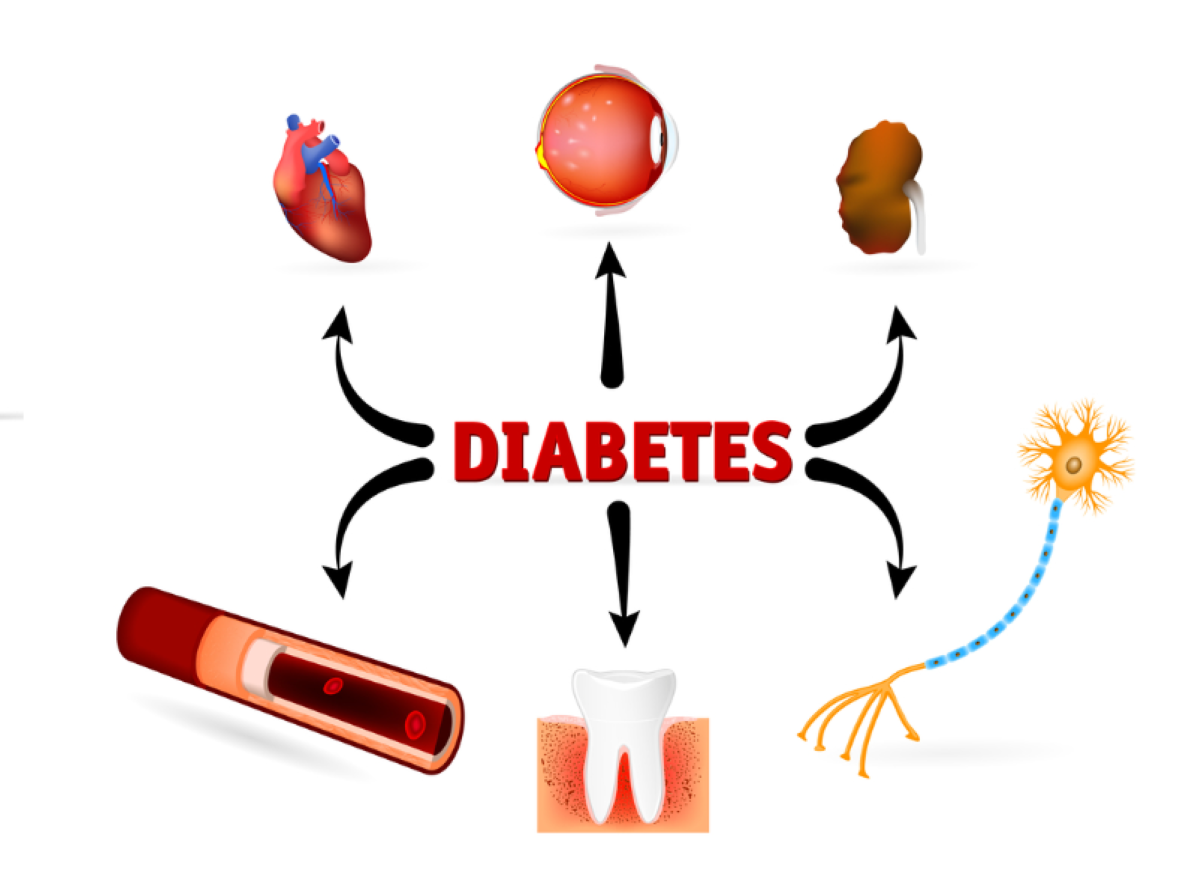
Diabetes can affect different parts of your body like the heart, kidneys, eyes, feet, and legs. When people think of diabetes, they usually think about high blood sugar levels. Blood sugar levels are really important for your health, and if they are unbalanced for a long time, it can lead to diabetes.
Getting your diabetes in check requires effort, but the outcomes are truly valuable. Unmanaged diabetes indicates elevated blood sugar levels, even with treatment. This could manifest in symptoms like increased urination, frequent thirst, and other diabetes-related issues. Failing to address it properly could pave the way for a range of complications. Below we will discuss the significant side effects of diabetes on the functionality of various organs in the body, including on your:
Diabetes is known to double the risk of heart disease and stroke. High blood glucose levels contribute to the formation of fatty deposits in blood vessel walls, leading to a condition called atherosclerosis, which restricts blood flow and increases the risk of heart disease and stroke. High blood glucose levels can lead to decreased elasticity and narrowing of blood vessels, hindering blood flow and oxygen supply. This can increase the risk of high blood pressure and damage to both large and small blood vessels.
There is a close link between diabetes and cardiovascular problems. Diabetes can significantly increase the risk of heart disease, including heart attacks, strokes, and peripheral arterial disease. People with diabetes may seek help from specialists at the Dr LH Hiranandani Hospital, which is renowned for its diabetology treatment in Mumbai. Diabetes can lead to damage of both small blood vessels (microvascular disease) and large blood vessels (macrovascular disease), increasing the risk of complications such as retinopathy, nephropathy, and neuropathy.
Diabetes can have significant effects on the eyes, potentially leading to various complications. Here are some of the ways in which diabetes can impact eye health:
There is significant side effects of diabetes on the kidneys, leading to a condition known as diabetic nephropathy. Over time, high blood sugar levels can damage the blood vessels in the kidneys, causing them to become less effective at filtering waste products from the blood. Here are some of the effects of diabetes on the kidneys:
Chronic high blood sugar levels can harm the nerves, leading to diabetic neuropathy. This can result in numbness, tingling, or pain, particularly in the extremities such as the legs, feet, arms, and hands. There are different types of diabetic neuropathy, including peripheral neuropathy, autonomic neuropathy, proximal neuropathy, and focal neuropathy. Each type affects different nerves and results in distinct symptoms.
One common effect of diabetic neuropathy is the loss of sensation or feeling in the affected areas. This can lead to injuries going unnoticed, which can lead to serious infections or other complications. Some individuals with diabetic neuropathy may experience sharp, stabbing pain or heightened sensitivity to touch in the affected areas. Diabetes can also impact the autonomic nervous system, which controls involuntary functions such as digestion, heart rate, and blood pressure. This can lead to issues with digestion, blood pressure regulation, and other autonomic functions.
Men with diabetes are more than three times likely to develop erectile dysfunction compared to those without diabetes. This condition can occur earlier and may be more severe in individuals with diabetes. Factors such as nerve damage, poor blood flow, and hormonal imbalances can contribute to erectile dysfunction. Women with diabetes may experience reduced libido and sexual function due to altered blood flow, nerve damage, and hormonal changes. These factors can affect arousal, lubrication, and sexual satisfaction.
Studies have shown that men with both type 1 and type 2 diabetes tend to have lower sperm quality and a higher risk of infertility. Factors such as altered sperm function and hormonal imbalances can contribute to male infertility in diabetes.
Diabetes-related nerve damage can affect sexual responses and the body's ability to send and respond to sexual stimuli, impacting sexual function and satisfaction in both men and women.
There are correlations between diabetes and a variety of skin conditions. Symptoms can vary in severity from mild to severe. Here are some of the ways diabetes can impact the skin:
Related: Pre-Diabetes: Signs, Symptoms, and Prevention Tips
For individuals concerned about managing diabetes and seeking the best diabetology doctor in Mumbai for comprehensive care, Dr LH Hiranandani Hospital is among the top diabetology hospitals in Mumbai, known for its specialized diabetology treatment in Mumbai.